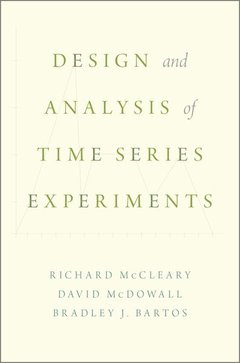Description
Design and Analysis of Time Series Experiments
Authors: McCleary Richard, McDowall David, Bartos Bradley
Language: English
Subjects for Design and Analysis of Time Series Experiments:
63.71 €
In Print (Delivery period: 21 days).
Add to cart
Design and Analysis of Time Series Experiments
Publication date: 06-2017
392 p. · 17.3x23.4 cm · Paperback
Publication date: 06-2017
392 p. · 17.3x23.4 cm · Paperback
Approximative price 140.09 €
In Print (Delivery period: 21 days).
Add to cart
Design and Analysis of Time Series Experiments
Publication date: 06-2017
392 p. · 16.2x23.8 cm · Hardback
Publication date: 06-2017
392 p. · 16.2x23.8 cm · Hardback
Description
/li>Biography
/li>
Design and Analysis of Time Series Experiments presents the elements of statistical time series analysis while also addressing recent developments in research design and causal modeling. A distinguishing feature of the book is its integration of design and analysis of time series experiments. Drawing examples from criminology, economics, education, pharmacology, public policy, program evaluation, public health, and psychology, Design and Analysis of Time Series Experiments is addressed to researchers and graduate students in a wide range of behavioral, biomedical and social sciences. Readers learn not only how-to skills but, also the underlying rationales for the design features and the analytical methods. ARIMA algebra, Box-Jenkins-Tiao models and model-building strategies, forecasting, and Box-Tiao impact models are developed in separate chapters. The presentation of the models and model-building assumes only exposure to an introductory statistics course, with more difficult mathematical material relegated to appendices. Separate chapters cover threats to statistical conclusion validity, internal validity, construct validity, and external validity with an emphasis on how these threats arise in time series experiments. Design structures for controlling the threats are presented and illustrated through examples. The chapters on statistical conclusion validity and internal validity introduce Bayesian methods, counterfactual causality and synthetic control group designs. Building on the earlier of the authors, Design and Analysis of Time Series Experiments includes more recent developments in modeling, and considers design issues in greater detail than any existing work. Additionally, the book appeals to those who want to conduct or interpret time series experiments, as well as to those interested in research designs for causal inference.
Richard McCleary is Professor of Criminology, Law & Society and Planning, Policy & Design at the University of California, Irvine. David McDowall is Distinguished Teaching Professor in the School of Criminal Justice at the University at Albany. Bradley J. Bartos is a graduate student in the department of Criminology, Law, and Society at the University of California, Irvine.
© 2024 LAVOISIER S.A.S.

